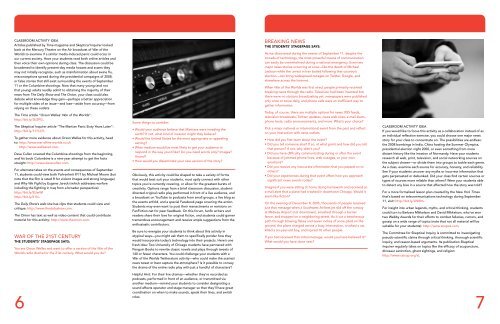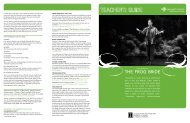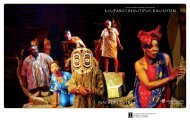War of the Worlds
Teacher's Guide - Krannert Center Youth Series
Teacher's Guide - Krannert Center Youth Series
- No tags were found...
You also want an ePaper? Increase the reach of your titles
YUMPU automatically turns print PDFs into web optimized ePapers that Google loves.
Classroom Activity Idea<br />
Articles published by Time magazine and Skeptical Inquirer looked<br />
back at <strong>the</strong> Mercury Theatre on <strong>the</strong> Air broadcast <strong>of</strong> <strong>War</strong> <strong>of</strong> <strong>the</strong><br />
<strong>Worlds</strong> to examine if a similar media-induced panic could occur in<br />
our current society. Have your students read both online articles and<br />
<strong>the</strong>n voice <strong>the</strong>ir own opinions during class. The discussion could be<br />
broadened to identify present-day media hoaxes and scams <strong>the</strong>y<br />
may not initially recognize, such as misinformation about swine flu,<br />
misconceptions spread during <strong>the</strong> presidential campaigns <strong>of</strong> 2008,<br />
or false stories that still exist surrounding <strong>the</strong> events <strong>of</strong> September<br />
11 or <strong>the</strong> Columbine shootings. Now that many young (and not<br />
that young) adults readily admit to obtaining <strong>the</strong> majority <strong>of</strong> <strong>the</strong>ir<br />
news from The Daily Show and The Onion, your class could also<br />
debate what knowledge <strong>the</strong>y gain—perhaps a better appreciation<br />
for multiple sides <strong>of</strong> an issue—and lose—aside from accuracy—from<br />
relying on <strong>the</strong>se outlets.<br />
The Time article “Orson Welles’ <strong>War</strong> <strong>of</strong> <strong>the</strong> <strong>Worlds</strong>”:<br />
http://bit.ly/3ti2PG.<br />
The Skeptical Inquirer article “The Martian Panic Sixty Years Later”:<br />
http://bit.ly/117LC9.<br />
To ga<strong>the</strong>r more evidence about Orson Welles for this activity, head<br />
to: http://www.war-<strong>of</strong><strong>the</strong>-worlds.co.uk<br />
http://www.wellesnet.com.<br />
Dave Cullen covered <strong>the</strong> Columbine shootings from <strong>the</strong> beginning,<br />
and his book Columbine is a nine-year attempt to get <strong>the</strong> facts<br />
straight: http://www.davecullen.com.<br />
For alternate takes on <strong>the</strong> events and consequences <strong>of</strong> September<br />
11, students could view both Fahrenheit 9/11 by Michael Moore (but<br />
note that <strong>the</strong> film is rated R for violent images and strong language)<br />
and Why We Fight by Eugene Jarecki (which addresses warfare<br />
including <strong>the</strong> fighting in Iraq from a broader perspective):<br />
http://bit.ly/EUwWi<br />
http://bit.ly/lI1In.<br />
The Daily Show’s web site has clips that students could view and<br />
critique: http://www.<strong>the</strong>dailyshow.com.<br />
The Onion has text as well as video content that could contribute<br />
material for this activity: http://www.<strong>the</strong>onion.com.<br />
war <strong>of</strong> <strong>the</strong> 21st century<br />
The students’ StagePage says:<br />
You are Orson Welles and want to <strong>of</strong>fer a version <strong>of</strong> <strong>the</strong> <strong>War</strong> <strong>of</strong> <strong>the</strong><br />
<strong>Worlds</strong> radio drama for <strong>the</strong> 21st century. What would you do?<br />
Some things to consider:<br />
• Would your audience believe that Martians were invading <strong>the</strong><br />
earth? If not, what kind <strong>of</strong> invasion might <strong>the</strong>y believe?<br />
• Would <strong>the</strong> United States be <strong>the</strong> most appropriate or appealing<br />
setting?<br />
• What medium would be most likely to get your audience to<br />
respond in <strong>the</strong> way you’d like? Do you need words only? Images?<br />
Sound?<br />
• How would you disseminate your new version <strong>of</strong> <strong>the</strong> story?<br />
Obviously, this activity could be shaped to take a variety <strong>of</strong> forms<br />
that would best suit your students, most aptly connect with o<strong>the</strong>r<br />
topics you’re currently covering, or allow for <strong>the</strong> greatest bursts <strong>of</strong><br />
creativity. Options range from a brief classroom discussion, studentdirected<br />
original radio play performed in front <strong>of</strong> a live audience, and<br />
a broadcast on YouTube to podcasts from small groups, a live blog as<br />
<strong>the</strong> events enfold, and a special Facebook page covering <strong>the</strong> action.<br />
Students may even want to post <strong>the</strong>ir reenactments or revisions on<br />
FanFiction.net for peer feedback. On this forum, fanfic writers and<br />
readers share <strong>the</strong>ir love for original fiction, and students could garner<br />
tremendous encouragement and receive ample suggestions from <strong>the</strong><br />
enthusiastic contributors.<br />
Be sure to energize your students to think about this activity in<br />
atypical ways—you might ask <strong>the</strong>m to specifically ponder how <strong>the</strong>y<br />
would incorporate today’s technology into <strong>the</strong>ir projects. Here’s one<br />
fresh idea: Two University <strong>of</strong> Chicago students have partnered with<br />
Penguin Books to rewrite classic novels and plays through tweets <strong>of</strong><br />
140 or fewer characters. You could challenge your students with a<br />
<strong>War</strong> <strong>of</strong> <strong>the</strong> <strong>Worlds</strong> Twitterature activity—who could make <strong>the</strong> scariest<br />
news tweet or best capture <strong>the</strong> atmosphere? Is it possible to convey<br />
<strong>the</strong> drama <strong>of</strong> <strong>the</strong> entire radio play with just a handful <strong>of</strong> characters?<br />
breaking news<br />
The students’ StagePage says:<br />
As we discovered during <strong>the</strong> events <strong>of</strong> September 11, despite <strong>the</strong><br />
inroads <strong>of</strong> technology, <strong>the</strong> most powerful means <strong>of</strong> communication<br />
can easily be overwhelmed during a national emergency. Even two<br />
major news stories occurring at once—like <strong>the</strong> death <strong>of</strong> Michael<br />
Jackson while <strong>the</strong> unrest in Iran boiled following that country’s<br />
election—can bring widespread outages on Twitter, Google, and<br />
elsewhere across <strong>the</strong> Internet.<br />
When <strong>War</strong> <strong>of</strong> <strong>the</strong> <strong>Worlds</strong> was first aired, people primarily received<br />
breaking news through <strong>the</strong> radio. Television had been invented but<br />
<strong>the</strong>re were no stations broadcasting yet, newspapers were published<br />
only once or twice daily, and phone calls were an inefficient way to<br />
ga<strong>the</strong>r information.<br />
Today, <strong>of</strong> course, <strong>the</strong>re are multiple options for news: RSS feeds,<br />
television broadcasts, Twitter updates, news web sites, e-mail alerts,<br />
phone texts, radio announcements, and more. What’s your choice?<br />
Pick a major national or international event from <strong>the</strong> past and reflect<br />
on your interaction with news outlets.<br />
• How did you first learn about <strong>the</strong> event?<br />
• Did you tell someone else? If so, at what point and how did you tell<br />
that person? If not, why didn’t you?<br />
• Did you have difficulty communicating during or after <strong>the</strong> event<br />
because <strong>of</strong> jammed phone lines, web outages, or your own<br />
emotions?<br />
• Did you receive any inaccurate information that you passed on to<br />
o<strong>the</strong>rs?<br />
• Did your experiences during that event affect how you approach<br />
significant news events today?<br />
Imagine if you were sitting at home doing homework and received an<br />
e-mail alert that a plane had crashed in downtown Chicago. Would it<br />
seem like fiction?<br />
On <strong>the</strong> evening <strong>of</strong> December 8, 2005, thousands <strong>of</strong> people received<br />
just that message when a Southwest Airlines jet slid <strong>of</strong>f <strong>the</strong> runway<br />
at Midway Airport (not downtown), smashed through a barrier<br />
fence, and stopped on a neighboring street. As it cut a treacherous<br />
path through blowing flakes and seven inches <strong>of</strong> snow piled on <strong>the</strong><br />
ground, <strong>the</strong> plane charged across a busy intersection, crushed a car,<br />
killed a six-year-old boy, and injured 10 o<strong>the</strong>r people.<br />
If you had received that initial message, would you have believed it?<br />
What would you have done next?<br />
Classroom Activity Idea<br />
If you would like to focus this activity as a collaboration instead <strong>of</strong> as<br />
an individual reflection exercise, you could choose one major news<br />
story for your class to concentrate on. The possibilities are endless:<br />
<strong>the</strong> 2008 bombings in India, China hosting <strong>the</strong> Summer Olympics,<br />
presidential election night 2000, or even something from more<br />
distant history like <strong>the</strong> invasion <strong>of</strong> Normandy. Have your students<br />
research all web, print, television, and social networking sources on<br />
<strong>the</strong> subject chosen—or divide <strong>the</strong>m into groups to tackle each genre.<br />
As a class, examine each source for accuracy, honesty, and reliability.<br />
See if your students uncover any myths or incorrect information that<br />
gets perpetuated or debunked. Did your class find certain sources or<br />
types <strong>of</strong> sources more reliable than o<strong>the</strong>rs? Were your students able<br />
to detect any bias in a source that affected how <strong>the</strong> story was told?<br />
For a more formalized lesson plan created by <strong>the</strong> New York Times<br />
that’s based on telecommunications technology during September<br />
11, visit: http://bit.ly/LNI8m.<br />
For insight into urban legends, myths, and critical thinking, students<br />
could turn to Barbara Mikkelson and David Mikkelson, who’ve won<br />
two Webby Awards for <strong>the</strong>ir efforts to combat fallacies, rumors, and<br />
gossip on a wide range <strong>of</strong> topics (note that not all material will be<br />
suitable for your students): http://www.snopes.com.<br />
The Committee for Skeptical Inquiry is committed to investigating<br />
pseudo-scientific claims through critical thinking, thorough scientific<br />
inquiry, and reason-based arguments. Its publication Skeptical<br />
Inquirer regularly takes on topics like <strong>the</strong> efficacy <strong>of</strong> acupuncture,<br />
dinosaur extinction, ghost sightings, and religion:<br />
http://www.csicop.org/si.<br />
6<br />
Helpful Hint: For <strong>the</strong>ir live dramas—whe<strong>the</strong>r <strong>the</strong>y’re recorded as<br />
podcasts, performed in front <strong>of</strong> an audience, or transmitted via<br />
ano<strong>the</strong>r medium—remind your students to consider designating a<br />
sound effects operator and stage manager so that <strong>the</strong>y’ll have great<br />
coordination on when to make sounds, speak <strong>the</strong>ir lines, and switch<br />
roles.<br />
7





